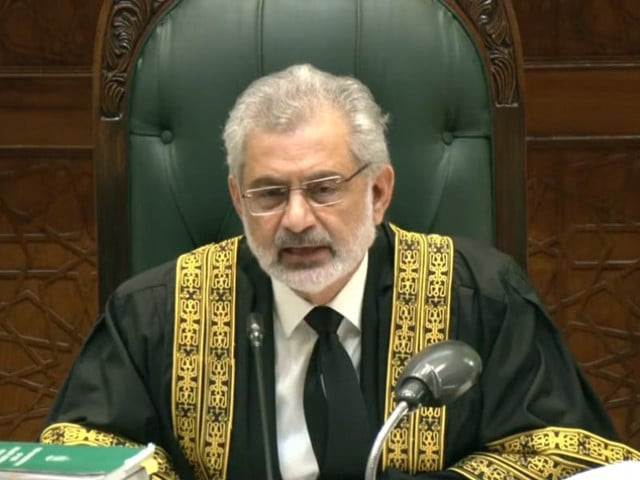CJ says judges are undeterred by criticism
SC allows PFUJ to become party to suo motu case

Chief Justice of Pakistan Qazi Faez Isa observed on Tuesday that the court could only interpret law but it could not enact legislation, and emphasised that the court could not provide any help in the absence of the relevant law.
Heading a three-judge bench including Justice Muhammad Ali Mazhar and Justice Musarat Hilali for hearing of a suo motu case pertaining to the harassment of journalists by the Federal Investigation Agency (FIA), the chief justice stated that he only followed the Constitution and law.
The Pakistan Federal Union of Journalists (PFUJ) informed the bench that the FIA was mixing criticism with trolling. Sitting on the bench, Justice Mazhar remarked that there was no law to regulate social media. “No regulatory laws apply to social media,” he said.
On that the chief justice remarked that the court could interpret law but it could not enact a law. “What we can do when there is no law,” he said, adding that the court could only request the stakeholders to sit together. “We follow the Constitution and the law. Criticism doesn’t matter to us.”
Read also: JIT puts CJP Isa's assurances on trial
The attorney general for Pakistan (AGP) told the bench that the FIA had assured that the process of issuing notices to journalists would be delayed until general elections. The AGP reiterated his earlier statement to the court on Monday that no action would be taken against journalists.
The court sought report about the investigation into the attack on journalist Absar Alam. It also allowed the PFUJ to become a party to the case. The court further said that the Press Association of the Supreme Court (PAS) could file an application if it wanted to do so.
The journalistic organisations requested the court to suspend the FIA notices. However, the chief justice replied that the court had not seen any notice yet; adding that if something came in writing then the court could proceed.
A journalist told the bench that attempts were being made to control the media before the elections. On that the chief justice told the journalist to put it into writing. Later, the hearing was postponed until the first week of March.



















COMMENTS
Comments are moderated and generally will be posted if they are on-topic and not abusive.
For more information, please see our Comments FAQ